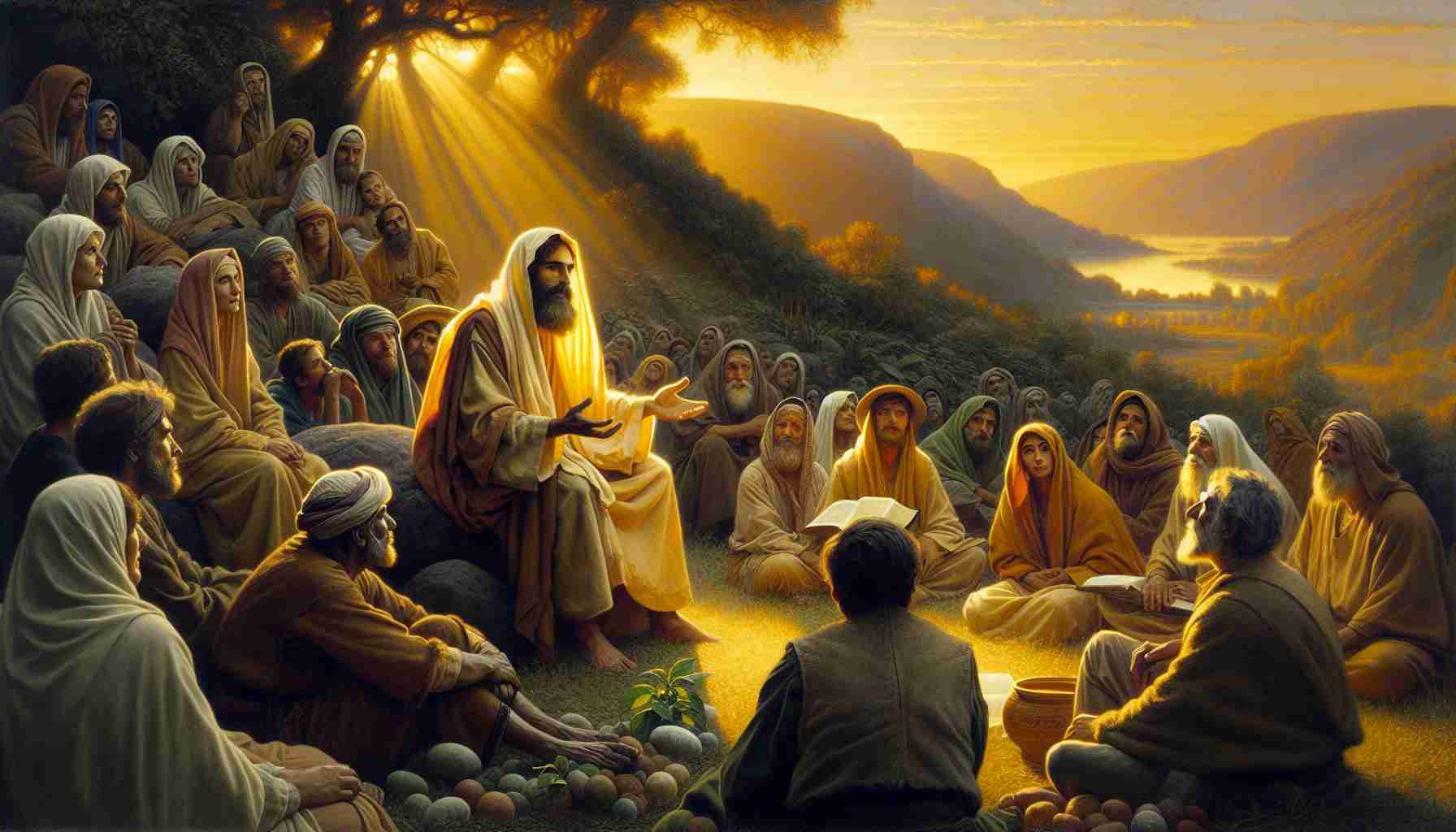

Dust blew across the path where my sandals scraped the dry earth, the Galilean sun a hot weight on my back. I pulled my cloak tighter, not for warmth, but to hide the sickle-shaped scar on my wrist—a mark of shame from the night I tried to steal bread from the market stalls in Capernaum. The Roman patrol had caught me, and though they let me live, the villagers never let me forget. Since then, I kept to the edges of the crowd, my ears always open, my heart closed.
Today was no different—until the fisherman’s son tugged at my sleeve.
“They say He’s speaking again, by the water,” he whispered, pointing toward the sea.
I followed, not because I believed, but because hope is a stubborn thing. The shoreline below teemed with people, pressing so close that the man—Jesus, they called Him—had to sit in a boat just off shore. His voice reached us like the wind: gentle, steady, somehow sharp as a blade.
“A farmer went out to sow his seed…” he began.
I squinted, confused. This was the story that drew thousands? Dirt and seeds?
“Some fell along the path, and birds came and ate it. Others landed on rocky places, where there wasn’t much soil…”
His words were strange, almost childish—until something struck in me. I watched him closely. He wasn’t laughing. He wasn’t tricking us. He watched us like a man who held something important—hidden, but freely offered.
I thought of the scar on my wrist. Of how quickly I’d hardened my heart after the beating. Rocks don’t hold roots.
When the crowd murmured and half-drifted away, I didn’t move. A few of us lingered as the sky began to flush gold. He came ashore then, walking slowly, as if to let us decide whether we wanted to stay. I stayed.
One of the fishermen—his companion—asked Him why He always spoke in riddles. The Teacher turned, his eyes scanning our faces.
“Because not everyone wants to understand,” He said plainly. “But for those who seek—truth will find them.”
His gaze landed on me. I wanted to look away, but couldn’t. There was no judgment in His eyes, no pity either. Just something heavy and vast—like kindness, with authority.
He stepped closer.
“You’ve heard the stories,” He said. Not a question.
I nodded. “But I don’t understand.”
“You’re beginning to,” He said.
And in that moment, I believed Him.
The hardness in my chest—that stoney wall I built after betrayal, after disgrace—shifted. A crack formed. I caught my breath, startled by the sting of possibility.
I walked home under a darkening sky, the parable echoing in my head. Seed. Soil. Sun.
I didn’t know what tomorrow held. Maybe the town would still call me thief. Maybe healing would take time. But something sacred had taken root.
This time, I would guard it. This time, I would let it grow.
Dust blew across the path where my sandals scraped the dry earth, the Galilean sun a hot weight on my back. I pulled my cloak tighter, not for warmth, but to hide the sickle-shaped scar on my wrist—a mark of shame from the night I tried to steal bread from the market stalls in Capernaum. The Roman patrol had caught me, and though they let me live, the villagers never let me forget. Since then, I kept to the edges of the crowd, my ears always open, my heart closed.
Today was no different—until the fisherman’s son tugged at my sleeve.
“They say He’s speaking again, by the water,” he whispered, pointing toward the sea.
I followed, not because I believed, but because hope is a stubborn thing. The shoreline below teemed with people, pressing so close that the man—Jesus, they called Him—had to sit in a boat just off shore. His voice reached us like the wind: gentle, steady, somehow sharp as a blade.
“A farmer went out to sow his seed…” he began.
I squinted, confused. This was the story that drew thousands? Dirt and seeds?
“Some fell along the path, and birds came and ate it. Others landed on rocky places, where there wasn’t much soil…”
His words were strange, almost childish—until something struck in me. I watched him closely. He wasn’t laughing. He wasn’t tricking us. He watched us like a man who held something important—hidden, but freely offered.
I thought of the scar on my wrist. Of how quickly I’d hardened my heart after the beating. Rocks don’t hold roots.
When the crowd murmured and half-drifted away, I didn’t move. A few of us lingered as the sky began to flush gold. He came ashore then, walking slowly, as if to let us decide whether we wanted to stay. I stayed.
One of the fishermen—his companion—asked Him why He always spoke in riddles. The Teacher turned, his eyes scanning our faces.
“Because not everyone wants to understand,” He said plainly. “But for those who seek—truth will find them.”
His gaze landed on me. I wanted to look away, but couldn’t. There was no judgment in His eyes, no pity either. Just something heavy and vast—like kindness, with authority.
He stepped closer.
“You’ve heard the stories,” He said. Not a question.
I nodded. “But I don’t understand.”
“You’re beginning to,” He said.
And in that moment, I believed Him.
The hardness in my chest—that stoney wall I built after betrayal, after disgrace—shifted. A crack formed. I caught my breath, startled by the sting of possibility.
I walked home under a darkening sky, the parable echoing in my head. Seed. Soil. Sun.
I didn’t know what tomorrow held. Maybe the town would still call me thief. Maybe healing would take time. But something sacred had taken root.
This time, I would guard it. This time, I would let it grow.